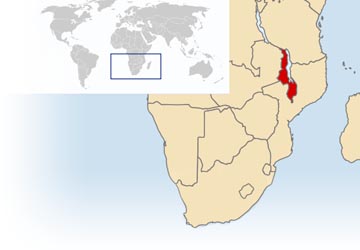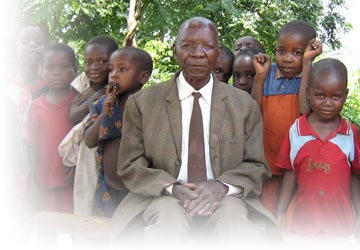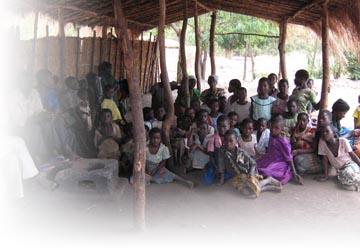 |
| About Malawi Malawi is a small African country with an approximate land mass of 118,480 sq. km and 20 per cent of that is dominated by Lake Malawi. It is considered one of the 10 poorest countries in the world and has an estimated GDP of just US$800 per capita, with the family income for many rural dwellers averaging less than US$0.50 a day for a family of 6 or 7 people. The predominant form of income is from the farming of crops such as maize, tobacco, vegetables, groundnuts and potatoes. For a country with an economy based on agriculture Malawi has a dense population, meaning the land available for farming per family is considerably less (over four times less) than that available to families in neighbouring Tanzania, Mozambique and Zambia. Due to low family incomes there are many vulnerable groups. These include children less than five years of age, orphans, those affected and infected by HIV/AIDS, the illiterate and the impoverished. |
 |
|
In spite of its poverty, Malawi is a peaceful country that has avoided many of the problems resulting from war that have been faced by other countries across the continent. It retains a good degree of political stability and has a democratically elected government. The official languages are Chichewa and English, with English being the language of both business and politics.
Further information about Malawi can be found at https://www.cia.gov/library/publications/the-world-factbook/geos/mi.html and also on Wikipedia at http://en.wikipedia.org/wiki/Malawi. |
| Chadza Traditional Authority (T/A) Chadza is an impoverished district located 15km south of Lilongwe, the capital city of Malawi. Hope Missions has been working into the villages under group village headman Kayabwa in this area since 2004. This group of 21 villages has an approximate population of 10,000 people, including children. Hope Missions has established three nursery schools in this area in the villages of Thugwalugwa, Lemesi and Kayabwa. We are also currently working with the local government primary school to improve teaching standards so that the education gained by the children in their early years at the nursery schools is not lost as they move on to primary schooling. To date we have also run two adult literacy classes in Kayabwa, delivered several life-skills worskhops for the youth and run a business training and development course. |
 |
| We are seeking to expand this work within the community to incorporate a greater diversity of skills-based training and other complementary programmes designed to have a lasting and sustainable impact on the education, spiritual well-being and skills base of the people in this area. As part of this, we are planning on increasing the work with community leaders, continuing to develop the existing nursery schools and expanding into agricultural projects which encourage the villagers to use organic farming methods in place of relying on expensive fertilizers. We were also invited to plant a church in Kayabwa in December 2004 which currently accommodates about 300 worshippers and is supported by Capital City Baptist Church in Lilongwe. |
| Masula Traditional Authority (T/A) Masula is located 20km south of Lilongwe. Hope Missions began its work into the villages under senior group village headman Chapsinja in this area in August 2008 following a direct invitation from Chief Chapsinja after his son attended a youth-workshop run by Hope Missions in Kayabwa. This group of 29 villages has an approximate population of 15,000 people, including children. Similarly to Kayabwa, the predominant form of income for the people of Chapsinja comes from farming cash-crops and livestock. Work into Chapsinja began with a church plant and discipleship and we are in the process of expanding into agricultural projects will secure a sustainable income stream to help fund the nursery school programme. We encourage the community to interact with every aspect of Hope Missions’ work in order to develop relationship and provide a forum for discipleship and training. |
 |
|
Hope Missions is benefitting from its experience with Kayabwa in relation to its work into Chapsinja and has commenced with a defined exit strategy in mind that will enable the community to continue to build on the work started. Sustainability is the focus of every aspect of Hope Missions’ work, to help villagers realise that they do not have to rely on ongoing support and intervention from external organisations but rather they can develop themselves by working together and using their own skills.
Hope Missions planted a church in Chapsinja at the request of the Chief in September 2008. This has grown rapidly and currently accomodates about 80 worshippers. |
| "Transforming communities through the implementation of programs which affect all areas of community life including: agriculture, education, economic empowerment, advocacy and discipleship, working through the local church and community leaders." |
Private Bag B510, City Centre, Lilongwe 3, MALAWI
Tel: +265 (0)999 392 545